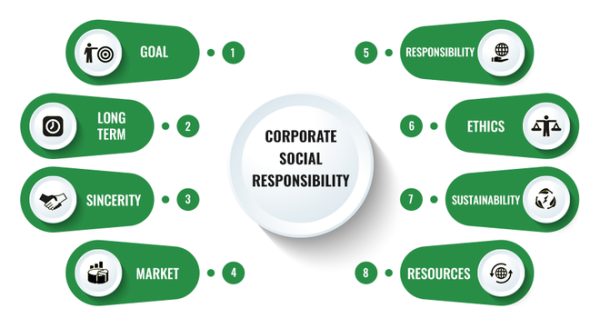Corporate Social Responsibility (CSR) is more than just a buzzword; it’s a commitment that businesses make to balance their profit-making ventures with ethical responsibility towards the environment and society.
In this article, we will explore the significance of CSR in today’s business landscape, with a specific focus on environmental stewardship.
By understanding the importance of CSR and its various dimensions, we can appreciate how it not only benefits society but also contributes to the long-term success and growth of businesses.
What is Corporate Social Responsibility?
Think of Corporate Social Responsibility or CSR as a company’s commitment to act ethically, considering the environment and society’s well-being alongside its profit-making activities.
It’s about balancing the drive for profits with the needs of stakeholders, including employees, customers, and the community.
When a company integrates CSR into its business model, it’s not just about donating money to charity. It’s about making a real, meaningful difference in society. It’s about being a good corporate citizen.
And in the long run, businesses that take CSR seriously tend to win the trust and loyalty of their customers, which can lead to sustainable growth and success.
Image by Freepik
The Importance of CSR in Business
CSR plays a crucial role in business as a strategic tool for growth and longevity. Embracing CSR can enhance your brand’s reputation, making your business more appealing to customers, potential employees, and investors.
It’s not just about doing good; it’s about creating sustainable value. When you instill CSR in your company’s strategy, you’re likely to see increased employee engagement, customer loyalty, and innovation.
You’ll also be better prepared to manage potential risks and regulatory issues. Plus, you’re contributing to the bigger picture – a sustainable future.
Environmental Stewardship as Corporate Social Responsibility
As a key aspect of your company’s CSR, embracing environmental stewardship can significantly improve your brand’s image and contribute to a more sustainable world.
By choosing to act responsibly towards the environment, you’re not just minimizing your company’s ecological footprint but also demonstrating a commitment to a cause that resonates with consumers and stakeholders alike.
This could involve:
- implementing energy-efficient systems
- reducing waste
- promoting recycling
- supporting green initiatives
Building Trust Through Transparency
Your company’s commitment to ethical entrepreneurship, clearly communicated and demonstrated, is the first step to building trust through transparency.
It’s about making your core values and operations clear to stakeholders. You’re not just talking the talk, you’re walking the walk. It’s honesty in action.
Transparent practices show your customers and employees that you’re trustworthy. You’re not hiding anything. You’re open and genuine about your intentions and actions. This transparency fosters a strong bond of trust.
Remember, today’s consumers are savvy. They want to know where their products are coming from, how they’re made, and who’s making them. They’re invested in your company’s journey. They’re rooting for you. But they want to see that you’re doing things right.
The Three Theaters of CSR
Now that you’ve seen the impact of CSR on business performance, let’s delve into the three theaters of CSR, a concept that further amplifies the effectiveness of these initiatives.
- Theater One revolves around philanthropy, where companies donate to social causes, often without a direct link to their business activities.
- Theater Two involves integrating CSR into a company’s core operations, where social benefits are derived as a direct result of business activities.
- Theater Three entails transforming the business model itself to address social issues, possibly creating new markets and customer groups.
These theaters aren’t mutually exclusive. Companies often operate in more than one, depending on their strategic approach to CSR.
Ethical Responsibility in CSR
Ethical responsibility means ensuring fair treatment for all stakeholders, from your leadership team and employees to suppliers and customers.
It involves setting higher minimum wages and sourcing products according to fair trade standards. You’re responsible for ensuring your products aren’t sourced through slavery or child labor.
In essence, ethical responsibility in CSR encapsulates behaving fairly and transparently in all dealings.
It’s about being accountable for your actions, making decisions that benefit everyone involved, and fostering an environment of trust.
Philanthropic Initiatives in Business
These initiatives are ways your business can give back to society, often through charitable donations or community programs. More than just writing a check, effective philanthropy involves strategic planning and thoughtful implementation.
Here are some ways to incorporate philanthropy into your business:
- Establish a corporate foundation: This allows you to donate a portion of your profits to causes that align with your company’s mission.
- Employee volunteer programs: Encourage your staff to participate in local community service projects.
- Matching gift programs: Match the charitable contributions made by your employees to double the impact.
Economic Responsibility in CSR
In your company’s journey towards embracing CSR, economic responsibility becomes a crucial aspect to consider. It’s not just about profitability, but balancing financial success with the well-being of society and the environment. Responsible financial decisions can have a profound positive impact on people and the planet.
Consider investing in sustainable business practices that promise long-term success, rather than short-term gains. Incorporate responsible supply chain management, ensuring your suppliers also uphold CSR principles.
Economic responsibility also involves supporting local communities, providing jobs, and contributing to their economic growth.
Developing Effective CSR Strategies
Creating a strong CSR (Corporate Social Responsibility) strategy can make a big difference in how a business interacts with the world.
A good CSR plan tackles important social and environmental issues, making sure that business activities don’t harm society, communities, employees, customers, and other important groups.
Here’s Harvard Business Review’s four-step guide to crafting a CSR strategy that works. These steps don’t have to be in order, and you can loop back and adjust as needed.
1. Make your CSR efforts work together.
First, it’s all about making sure your CSR actions fit well with each other and make sense for your business. Stop any activities that don’t help solve a social or environmental problem.
Your CSR should feel like a natural part of what your company stands for. For example, while a local café might focus on reducing waste, a big fashion brand could work on improving the lives of workers in its overseas factories.
2. Choose the right way to measure success.
What you track should reflect your objectives and where your projects fit within the three theaters of CSR.
If you have initiatives aimed at boosting your business somehow (theater two), you might look at how much money you’re saving or making. If it’s purely to do good (theater one), you’d use different yardsticks.
3. Link your CSR projects.
The goal here is to pick related CSR activities that help boost each other’s impact. By doing this, you create a set of plans that all work well together.
For example, Abatement Contractors in Southern California can effectively combine CSR efforts by integrating environmental sustainability, community health, and education initiatives.
They can prioritize eco-friendly practices within their operations and offer safety training to local communities, empowering them to handle hazardous materials responsibly.
4. Get everyone involved in your CSR plan.
A successful CSR plan needs everyone in the company, from the top bosses to the everyday workers, to understand and support it. Everyone should know what the business is doing for good causes and why it’s important.
Current Trends in CSR and Sustainability
There’s a growing demand for transparency and accountability, with an emphasis on ethical sourcing and practices.
More businesses are integrating ESG (Environmental, Social, and Governance) factors into their core strategy. They’re not just ‘doing good’ but ‘doing good business.’
There’s a rising trend of stakeholder capitalism, where companies are accountable to all stakeholders, including employees, communities, and the environment, not just shareholders.
Lastly, companies are increasingly communicating their CSR efforts through sustainability reports, showcasing their commitment to responsible business practices.
These trends reflect a shift towards a more responsible and sustainable business approach, which is beneficial for all.
Impact of Corporate Social Responsibility on Business Performance
While you might think that embracing CSR is all about being a good corporate citizen, it’s important to understand that it can also have a significant impact on your business’s bottom line.
- Engaging in CSR activities can boost your company’s image and reputation, leading to increased customer loyalty and subsequently, higher sales.
- It can also attract and retain top talent, as today’s workforce often seeks employers who demonstrate social responsibility.
- CSR can lead to operational efficiencies, such as cost savings from implementing sustainable practices.
- It can mitigate risk by ensuring compliance with regulations and avoiding potential scandals.
Final Thoughts
In a world where consumers are increasingly conscious of the impact of their choices, embracing Corporate Social Responsibility, particularly through environmental stewardship, is not just an option but a necessity for businesses.
Integrating CSR into their core operations, practicing ethical responsibility, and engaging in philanthropic initiatives help companies build trust, enhance their reputation, and secure sustainable growth.
As current trends continue to emphasize transparency and accountability, the role of CSR in business performance becomes more pronounced, creating a scenario where doing good also means doing well.
In essence, CSR is the pathway to a brighter, more responsible, and sustainable future for both businesses and society.








Leave A Comment